上海版六年级上牛津总复习
- 格式:pdf
- 大小:384.35 KB
- 文档页数:17
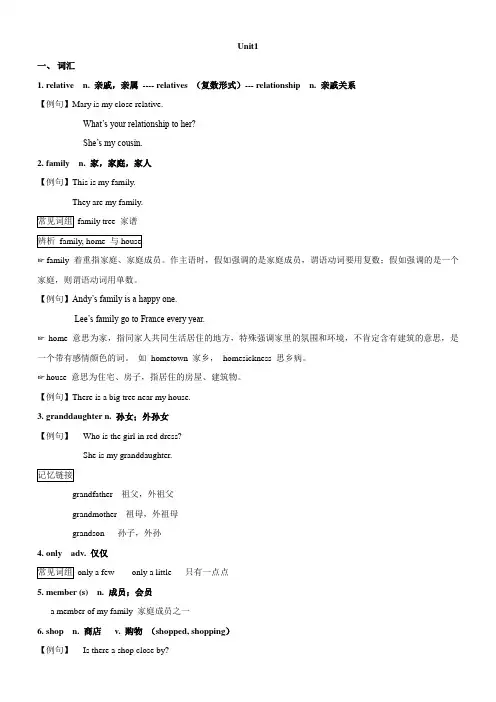
Unit1一、词汇1.relative n. 亲戚,亲属---- relatives (复数形式)--- relationship n. 亲戚关系【例句】Mary is my close relative.--- What’s your relationship to her?--- She’s my cousin.2.family n. 家,家庭,家人【例句】This is my family.They are my family.family tree 家谱☞ family 着重指家庭、家庭成员。
作主语时,假如强调的是家庭成员,谓语动词要用复数;假如强调的是一个家庭,则谓语动词用单数。
【例句】Andy’s family is a happy one.Lee’s family go to France every year.☞home 意思为家,指同家人共同生活居住的地方,特殊强调家里的氛围和环境,不肯定含有建筑的意思,是一个带有感情颜色的词。
如hometown 家乡,homesickness 思乡病。
☞ house 意思为住宅、房子,指居住的房屋、建筑物。
【例句】There is a big tree near my house.3. granddaughter n. 孙女;外孙女【例句】--- Who is the girl in red dress?--- She is my granddaughter.grandfather 祖父,外祖父grandmother 祖母,外祖母grandson 孙子,外孙4. only adv. 仅仅only a few only a little 只有一点点5. member (s) n. 成员;会员a member of my family 家庭成员之一6. shop n. 商店v. 购物(shopped, shopping)【例句】--- Is there a shop close by?--- Yes, there is a big shop on the right.--- I want to go shopping tomorrow.--- I’ll go with you.bookshop 书店shopping bag 购物袋shopping centre 购物中心shopping mall 大型购物商场go shopping 去购物= do some shopping 【例句】I have to go shopping this afternoon.= I have to do some shopping this afternoon. 7. else adv. 别的,其他的【例句】--- What else do you want?--- Nothing else, thank you.someone/anybody/nobody elsenothing/something/anything elsewho elsewhere elsewhat else?who else? 强调还有什么/谁...?8. badminton n. 羽毛球【例句】Tom likes playing badminton.play + 球类运动【例如】play tennis 打网球play table tennis 打乒乓球play football 踢足球play volleyball 打排球9. cycle n. 自行车v. 骑自行车【例句】They want to go there by cycle.He cycles to work every day.cycle 作名词时还有周期、循环的意思。
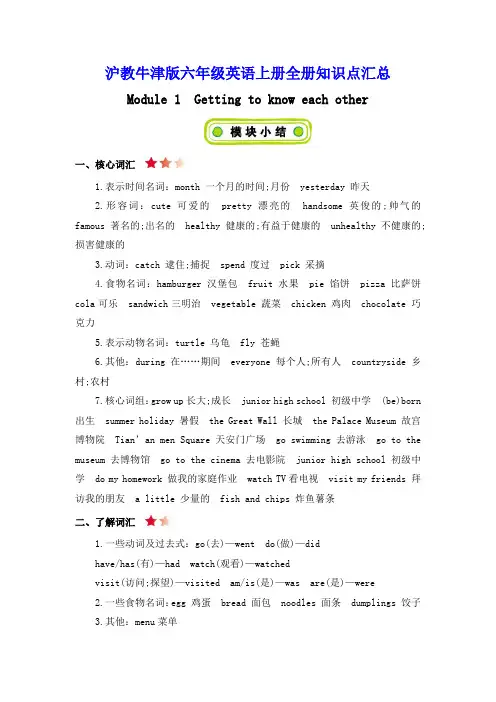
沪教牛津版六年级英语上册全册知识点汇总Module 1 Getting to know each other一、核心词汇1.表示时间名词:month 一个月的时间;月份yesterday 昨天2.形容词:cute 可爱的pretty 漂亮的handsome 英俊的;帅气的famous 著名的;出名的healthy 健康的;有益于健康的unhealthy 不健康的;损害健康的3.动词:catch 逮住;捕捉spend 度过pick 采摘4.食物名词:hamburger 汉堡包fruit 水果pie 馅饼pizza 比萨饼cola可乐sandwich三明治vegetable 蔬菜chicken 鸡肉chocolate 巧克力5.表示动物名词:turtle 乌龟fly 苍蝇6.其他:during 在……期间everyone 每个人;所有人countryside 乡村;农村7.核心词组:grow up长大;成长junior high school 初级中学(be)born 出生summer holiday 暑假the Great Wall 长城the Palace Museum 故宫博物院Tian’an men Square 天安门广场go swimming 去游泳go to the museum 去博物馆go to the cinema 去电影院junior high school 初级中学do my homework 做我的家庭作业watch TV看电视visit my friends 拜访我的朋友 a little 少量的fish and chips 炸鱼薯条二、了解词汇1.一些动词及过去式:go(去)—went do(做)—didhave/has(有)—had watch(观看)—watchedvisit(访问;探望)—visited am/is(是)—was are(是)—were2.一些食物名词:egg 鸡蛋bread 面包noodles 面条dumplings 饺子3.其他:menu菜单三、核心句型1.Her hair was short and her eyes were big. 她那时头发很短而且眼睛很大。
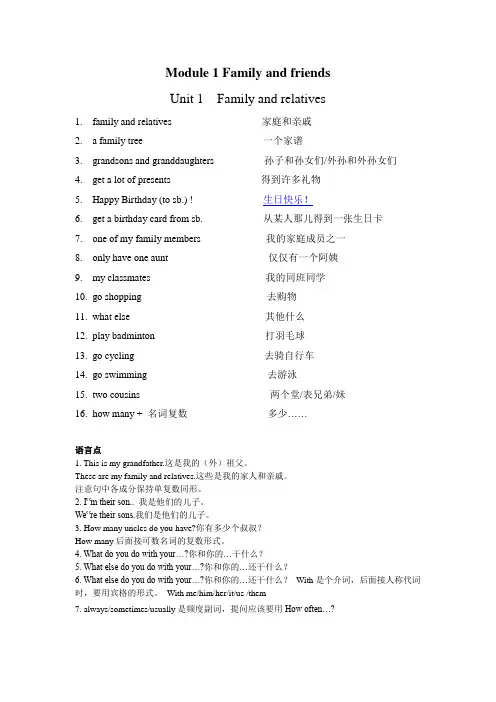
Module 1 Family and friendsUnit 1 Family and relatives1.family and relatives 家庭和亲戚2. a family tree 一个家谱3.grandsons and granddaughters 孙子和孙女们/外孙和外孙女们4.get a lot of presents 得到许多礼物5.Happy Birthday (to sb.) ! 生日快乐!6.get a birthday card from sb. 从某人那儿得到一张生日卡7.one of my family members 我的家庭成员之一8.only have one aunt 仅仅有一个阿姨9.my classmates 我的同班同学10.go shopping 去购物11.what else 其他什么12.play badminton 打羽毛球13.go cycling 去骑自行车14.go swimming 去游泳15.two cousins 两个堂/表兄弟/妹16.how many + 名词复数多少……语言点1. This is my grandfather.这是我的(外)祖父。
These are my family and relatives.这些是我的家人和亲戚。
注意句中各成分保持单复数同形。
2. I‟m their son.. 我是他们的儿子。
We‟re their sons.我们是他们的儿子。
3. How many uncles do you have?你有多少个叔叔?How many后面接可数名词的复数形式。
4. What do you do with your…?你和你的…干什么?5. What else do you do with your…?你和你的…还干什么?6. What else do you do with your…?你和你的…还干什么?With是个介词,后面接人称代词时,要用宾格的形式。
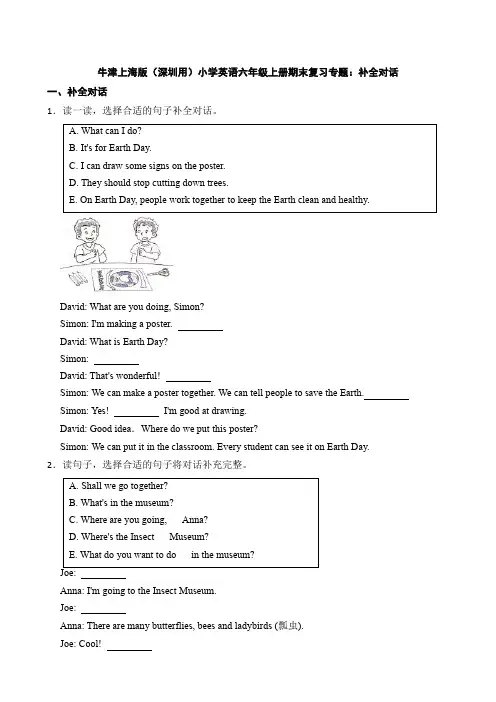
牛津上海版(深圳用)小学英语六年级上册期末复习专题:补全对话一、补全对话1.读一读,选择合适的句子补全对话。
David: What are you doing, Simon?Simon: I'm making a poster.David: What is Earth Day?Simon:David: That's wonderful!Simon: We can make a poster together. We can tell people to save the Earth.Simon: Yes! I'm good at drawing.David: Good idea.Where do we put this poster?Simon: We can put it in the classroom. Every student can see it on Earth Day. 2.读句子,选择合适的句子将对话补充完整。
Anna: I'm going to the Insect Museum.Joe:Anna: There are many butterflies, bees and ladybirds (瓢虫).Joe: Cool!Anna: I want to know how a ladybird grows up.Joe: That's really interesting. I want to see the beautiful butterflies there.Anna: Sure! Let's go!Joe:Anna: It's on Brown Street. We can go there by underground.3.选择适当的句子,完成对话。
Alice: I'm sorry, Dad.Dad: Let me have a look. Wow, so many pictures of wild animals!Alice: Yes.Dad: I see. You have South China tigers, giant pandas, African elephants and red foxes.Alice: People should do something to help them.Dad:Alice: We should stop cutting so many trees and protect the forest.And we mustn't hurt the wild animals.4.从所给出的句子中选出合适的选项完成对话。
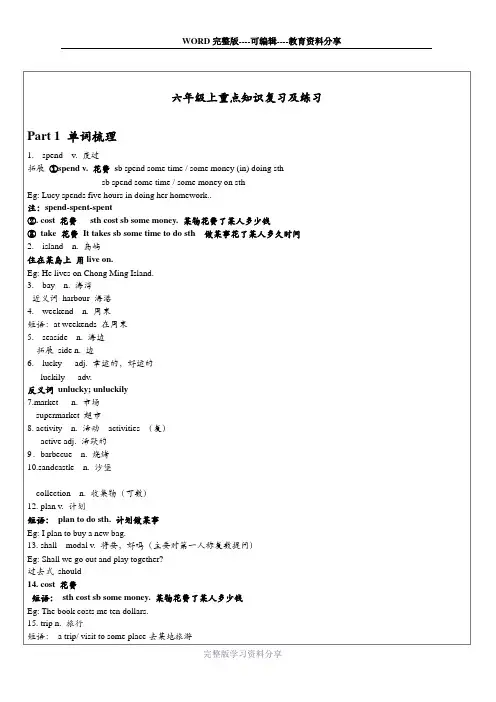
1.In the writer’s opinion, the most effective way in learning English is ____.A.to practise speaking, writing and feeling itB.to forget your own native languageC.to translate everything into his own languageD.to memorize the English words and grammatical rules2. “Instead of helping you, your own language gets in your way.”This sentence means that memorizing your own language can ________.A.help you to study English wellB.stop you mastering EnglishC.make English easy to learnD.help you notice mistakes3.Eq ually important is to feel the language. “to feel the language” here means________.A.to get a knowledge of English by touchingB.to be able to read and write EnglishC.to translate English into your own by imaginingD.to be able to experience the rich sensation of the languageBWhen we can see well, we do not think about our eyes often. It is only when we can not see perfectly that we come to see how important our eyes are.People who are nearsighted can only see things that are very close to their eyes. Many people who do a lot of close work, such as writing and reading, become nearsighted. Then they have to wear glasses in order to see distant things clearly. People who are farsighted face just the opposite problem. They can see things that are far away, but they have difficulty reading a book unless they hold it at arm’s length. If they want to do much reading, they must get glasses too.Other people do not see clearly because their eyes are not exactly the right shape. This, too, can be corrected by glasses. Some people’s eyes become cloudy because of cataracts. Long ago these people often became blind. Now, however, it is possible to operate on the cataracts and remove them.When night falls, colors become fainter to the eyes and finally disappear. After your eyes have grown used to the dark, you can see better if you use the side of your eyes rather than the centers. Sometimes, after dark, you see a small thing to one side of you, which seems to disappear if you turn your head in its direction. This is because when you turn your head, you are looking at the thing too directly. Men on guard duty sometimes think they see something moving to one side of them. When they turn to look straight at it, they can not see it any more, and they believe they were mistaken. However, this mistake happens because the center of the eye, which is very sensitive in daylight, is not as sensitive as the sides of the eye after dark.4.We don’t know that our eyes are of great importance until ________.A. we think about our eyesB. we cannot see clearlyC. we wear glassesD. we have to do much reading5.According to the passage, a ________ is more likely to be nearsighted.6.People who are farsighted ________ .A.cannot do a lot of close work without glassesB.can only see things that are very close to their eyesC.have difficulty reading a book if they hold it at arm’s lengthD.have the same problem as the nearsighted people7.To see a small thing at night, it is better to look ________ .A.with wide open eyesB.with half shut or narrowed eyesC.straight at itD.in a slightly different directionC Read and answer the questions.It's Sunday today. It's five o'clock in the afternoon. Dick is going to the supermarket with his parents. His father is now cleaning the car. He is going to drive his family to the supermarket. It is far away from their home. His mother is going to buy a lot of food: bread, milk, fruit and drinks. She also wants to buy many other things for the next week. Dick wants to buy a video game machine. His father says to him, 'OK, but you mustn't play video games all the time. After class you must go over your lessons and do your homework first.'They are going to have dinner there and come back at nine o'clock in the evening.They will enjoy themselves very much.( ) 1 Dick and his parents are going to do some shopping today.( ) 2 They are going to the supermarket by bus.( ) 3 The supermarket is not far away from their home.( ) 4 Dick's mother is going to buy a lot of food for the next week.( ) 5 Dick is going to buy a video game machine but he can't play it all the time.( ) 6 They are going to stay in the supermarket for 5 hours.Ⅴ.Choose the right answer.It's Sunday. Mother, father and the children are going to the beach.Alice: Where are we going, Dad?Father. Let's look at the map. Let me see. We will go to the East Point Beach.Mother: We'll swim in the sea.David: Are we going to have a picnic?Alice: Yes, of course.David: That's nice.Father: Come on! Let's all get in the car!Alice: What's wrong (怎么了), Dad?Father: The car can't start (发动)!Mother: So we will all stay at home.Alice: Let's have a picnic in the garden!David: Great!( )1 The family is going to ____________ .A. swim in the seaB. have a picnicC. swim and have a picnic( )2 They are going there ____________ .A. by busB. by carC. by underground( )3 They won't go to the beach ______________ .A. because it is rainyB. because Father is not fineC. because the car doesn't start( ) 4 They will have the picnic ____________ in the end.A. on the beach。
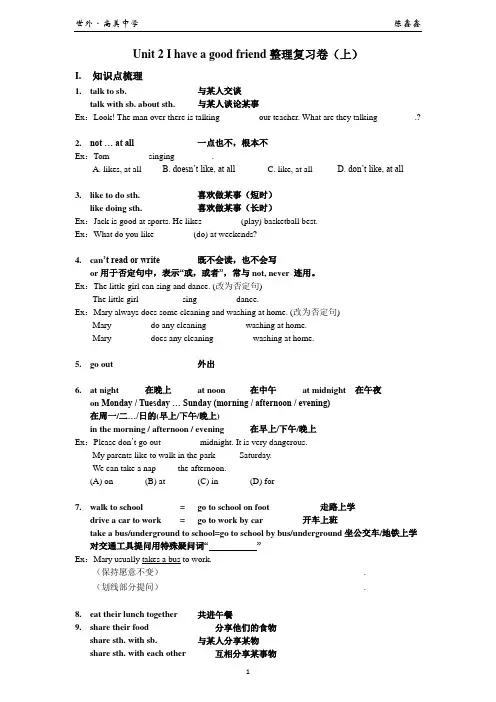
Unit 2 I have a good friend整理复习卷(上)I.知识点梳理1.talk to sb. 与某人交谈talk with sb. about sth. 与某人谈论某事Ex:Look! The man over there is talking ________ our teacher. What are they talking ________.?2.not … at all 一点也不,根本不Ex:Tom ________ singing ________.A. likes, at allB. doesn’t like, at allC. like, at allD. don’t like, at all3.like to do sth. 喜欢做某事(短时)like doing sth. 喜欢做某事(长时)Ex:Jack is good at sports. He likes ________ (play) basketball best.Ex:What do you like ________ (do) at weekends?4.can’t read or write既不会读,也不会写or用于否定句中,表示“或,或者”,常与not, never 连用。
Ex:The little girl can sing and dance. (改为否定句)The little girl _________ sing ________ dance.Ex:Mary always does some cleaning and washing at home. (改为否定句)Mary ________ do any cleaning ________ washing at home.Mary ________ does any cleaning ________ washing at home.5.go out 外出6.at night 在晚上at noon 在中午at midnight 在午夜on Monday / Tuesday … Sunday (morning / afternoon / evening)在周一/二…/日的(早上/下午/晚上)in the morning / afternoon / evening 在早上/下午/晚上Ex:Please don’t go out ________ midnight. It is very dangerous.My parents like to walk in the park _____Saturday.We can take a nap ____ the afternoon.(A) on (B) at (C) in (D) for7.walk to school = go to school on foot 走路上学drive a car to work = go to work by car 开车上班take a bus/underground to school=go to school by bus/underground坐公交车/地铁上学对交通工具提问用特殊疑问词“”Ex:Mary usually takes a bus to work.(保持愿意不变)______________________________________________.(划线部分提问)______________________________________________.8.eat their lunch together 共进午餐9.share their food 分享他们的食物share sth. with sb. 与某人分享某物share sth. with each other 互相分享某事物Ex:Alice and Kitty often share their food together.(保持原意)Alice often ________ her food ________ Kitty.Ex:I sometimes give books to my cousin. My cousin sometimes gives books to me. (合并为一句) My cousin and I sometimes ________ ________ books ________ ________ ________.10.help each other = help one another 互相帮助help other people = help others 帮助别人Ex:I like my friend. My friend likes me. (合并为一句)My friend and I like ___________ ____________.They always help other people. The underlined part means____.A. othersB. the othersC. the otherD. otherhelp v. 帮助helpful adj.有帮助的;有益的helpless adj. 无助的;没用的Ex:It is ____________ (help) to read English in the morning.11.be friendly to sb. = be kind to sb. 对某人友善/和蔼friend n. 朋友friendly adj. 友好的friendship n. 友谊kindness n. 仁慈,好意kind adj. 和蔼的,宽容的。
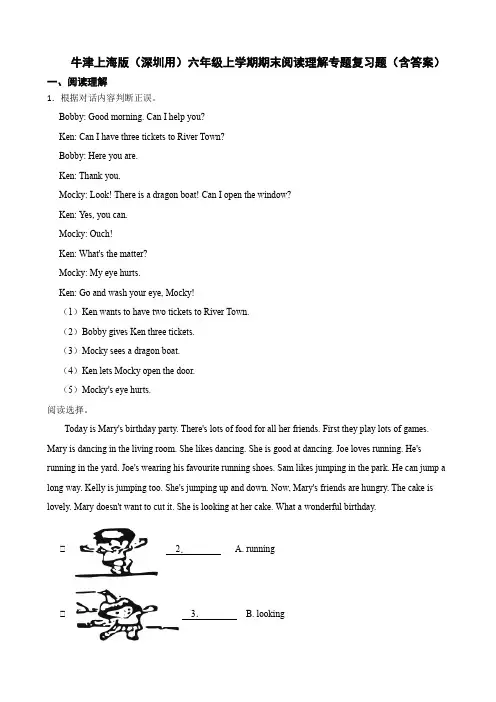
牛津上海版(深圳用)六年级上学期期末阅读理解专题复习题(含答案)一、阅读理解1.根据对话内容判断正误。
Bobby: Good morning. Can I help you?Ken: Can I have three tickets to River Town?Bobby: Here you are.Ken: Thank you.Mocky: Look! There is a dragon boat! Can I open the window?Ken: Yes, you can.Mocky: Ouch!Ken: What's the matter?Mocky: My eye hurts.Ken: Go and wash your eye, Mocky!(1)Ken wants to have two tickets to River Town.(2)Bobby gives Ken three tickets.(3)Mocky sees a dragon boat.(4)Ken lets Mocky open the door.(5)Mocky's eye hurts.阅读选择。
Today is Mary's birthday party. There's lots of food for all her friends. First they play lots of games. Mary is dancing in the living room. She likes dancing. She is good at dancing. Joe loves running. He's running in the yard. Joe's wearing his favourite running shoes. Sam likes jumping in the park. He can jump a long way. Kelly is jumping too. She's jumping up and down. Now, Mary's friends are hungry. The cake is lovely. Mary doesn't want to cut it. She is looking at her cake. What a wonderful birthday.⑴ 2. A. running⑴ 3. B. looking⑴ 4. C. dancing⑴ 5. D. jumping看图,根据图片意思选择答句。
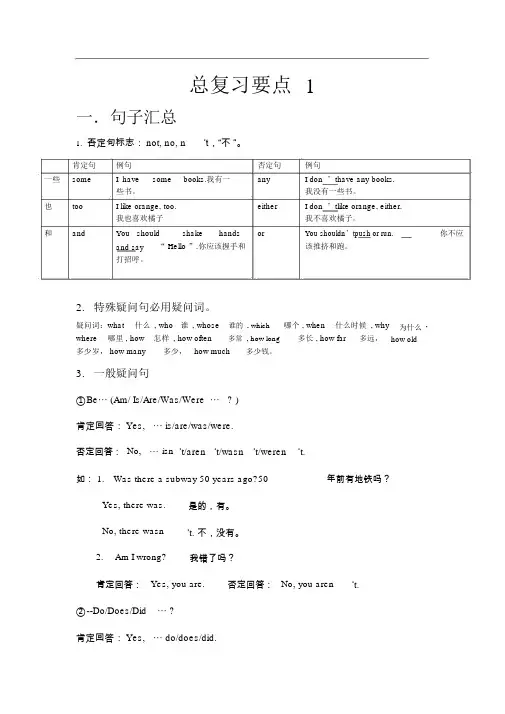
总复习要点1一.句子汇总1. 否定句标志:not, no, n’t,“不”。
肯定句例句否定句例句一些some I have some books.我有一any I don ’thave any books.些书。
我没有一些书。
也too I like orange, too.either I don ’tlike orange, either.我也喜欢橘子我不喜欢橘子。
和and You should shake hands or You shouldn’tpush or run.你不应and say“ Hello ”.你应该握手和该推挤和跑。
打招呼。
2.特殊疑问句必用疑问词。
疑问词:what什么, who谁, whose谁的, which where 哪里 , how怎样, how often多常, how long 多少岁, how many多少,how much多少钱。
哪个 , when什么时候, why多长 , how far多远,为什么how old,3.一般疑问句①Be⋯ (Am/ Is/Are/Was/Were ⋯ ? )肯定回答: Yes,⋯is/are/was/were.否定回答:No,⋯isn’t/aren’t/wasn’t/weren’t.如: 1. --Was there a subway 50 years ago?50年前有地铁吗?--Yes, there was.是的,有。
--No, there wasn’t. 不,没有。
2. -- Am I wrong?我错了吗?肯定回答:-Yes, you are.否定回答:-No, you aren’t.②--Do/Does/Did ⋯ ?肯定回答: Yes,⋯do/does/did.否定回答:No,⋯don’t/doesn’t/didn’t.如: Did you find something?你找到什么东西了吗?--Yes, I did.是的,我找到了。
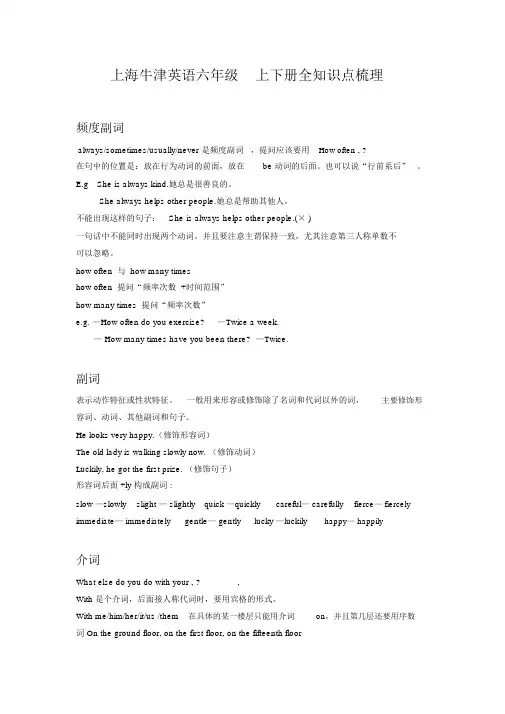
上海牛津英语六年级上下册全知识点梳理频度副词always/sometimes/usually/never 是频度副词,提问应该要用How often , ?在句中的位置是:放在行为动词的前面,放在be 动词的后面。
也可以说“行前系后”。
E.g She is always kind.她总是很善良的。
She always helps other people.她总是帮助其他人。
不能出现这样的句子:She is always helps other people.(× )一句话中不能同时出现两个动词。
并且要注意主谓保持一致,尤其注意第三人称单数不可以忽略。
how often 与 how many timeshow often 提问“频率次数 +时间范围”how many times 提问“频率次数”e.g. —How often do you exercise?—Twice a week.— How many times have you been there? —Twice.副词表示动作特征或性状特征。
一般用来形容或修饰除了名词和代词以外的词,主要修饰形容词、动词、其他副词和句子。
He looks very happy.(修饰形容词)The old lady is walking slowly now. (修饰动词)Luckily, he got the first prize. (修饰句子)形容词后面 +ly 构成副词 :slow —slowly slight — slightly quick —quickly careful— carefully fierce— fiercely immediate— immediately gentle— gently lucky —luckily happy— happily介词What else do you do with your , ?,With 是个介词,后面接人称代词时,要用宾格的形式。

Unit2一、词汇Words1. almost adv.(1)几乎【例句】Dinner is almost ready.(2)实际上,简直(用于no, nobody, none, nothing, never 之前)【例句】Almost no one believed him.【辨析】almost / nearly相同点:“几乎,将近,差不多”,当于动词、副词、形容词及名词连用时,意义接近,可互换。
【例句】It's nearly lunchtime.= It's almost lunchtime.2. never adv. 从不; always adv. 总是,一直【例句】She is always friendly and helpful.She always works hard.She is never late for school.She never gets angry.注意always 和never在句中的位置,它们都是副词常用于be动词之后、行为动词之前。
3. each other 互相,彼此【例句】Mary and Kitty always help each other.【常见词组】learn from each other 互相学习know each other 互相认识help each other 互相帮助【知识链接】each other 仅用作动词或介词的宾语,不可做主语。
【用法提示】each other 用于两者,one another 用于三者或三者以上。
each other one another(选词填空)I help you. You help me. We help __________.They three sat side by side and talked with ___________.4. friendly adj. 友好的【用法提示】friendly 常与介词to 和with 搭配构成词组1)be friendly to sb.“ ... 对某人友好”或“ 对某人友善”,指对别人的态度友好,相当于be kind to sb. 【例句】Our English teacher is friendly to us.=Our English teacher is kind to us.2)be friendly with sb. “ 和某人关系友好” 或“ 与某人要好”, 指的是两者的关系。
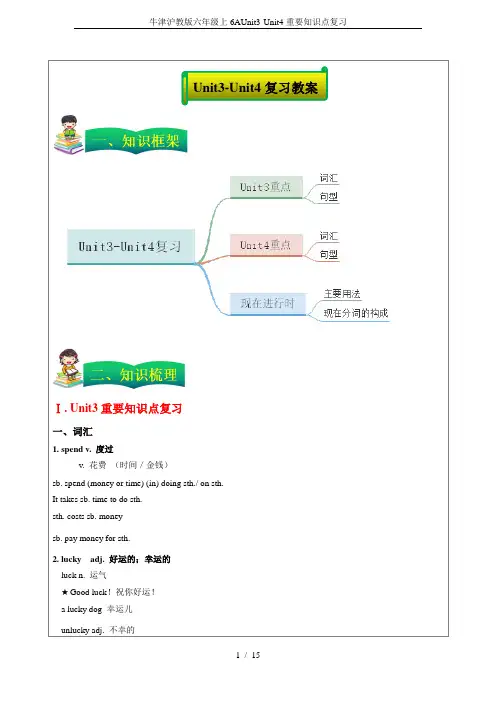
Unit3-Unit4复习教案Ⅰ. Unit3重要知识点复习一、词汇1. spend v. 度过v. 花费(时间/金钱)sb. spend (money or time) (in) doing sth./ on sth.It takes sb. time to do sth.sth. costs sb. moneysb. pay money for sth.2. lucky adj. 好运的;幸运的luck n. 运气★Good luck!祝你好运!a lucky dog 幸运儿unlucky adj. 不幸的4) 当动词为重读闭音节或以重读闭音节结尾时,要重复词尾的辅音字母,再加-ing,如:running, stopping, swimming, beginning 等.★现在进行时常用的时间状语有:now, nowadays, at the moment, these days等。
三、句型(1)肯定句:be + Ving I am listening to the music.(2)否定句:be + not +Ving I am not listening to the music.(3)一般疑问句:把Be动词提到句首Are you listening to the music?(4)特殊疑问句:疑问词+be+主语+Ving What are you doing?(当疑问词作主语时其结构为):疑问词+be+Ving Who is listening to the music?【课堂小练】I.练习一:现在分词的变形(错误率:掌握情况:)Model: do→ doing1. talk __________2. make __________3. study __________4. sing __________5. picnic __________6. run __________7. begin __________ 8. go __________ 9. write __________10. put __________ 11. lie __________ 12. die __________II.练习二:Fill in the blank in its proper tense.(错误率:掌握情况:)1. __________ your mother __________ rooms every day? (clean)2. A: Where __________ John? (be)B: He __________ a model ship in his room. (make)3. It’s already six o’clock in the afternoon. But those boys __________ (still play) computer games in thebet-bar.4. A: What __________ you __________? (do)B: I __________ (read) today’s newsp aper.5. When __________ your first class __________? (begin) -At 8:05.III.Choose the best answer (选择) (错误率:掌握情况:)( ) 1. _______________ c an fly a plane in the sky.A. A businessmanB. A firemanC. A cookD. A pilot ( )2. Mr Wang wants to make sick people feel ________________ .A. goodB. wellC. betterD. best ( )3. Samuel Han_______________ w ork at eight o'clock in the morning.A. startedB. startsC. finishedD. finish( )4. What ______________ your uncle do?A. doB. doesC. doingD. to do ( )5. I would like to be a teacher. That's ________________ I would like to be.A. howB. whatC. whenD. where ( )6. Mr Wang is a cook. He likes to cook delicious food _______________ people.A. withB. toC. forD. about ( )7. —How old are you?A. I am twenty-firstB. I am twenty-one year oldC. I am twenty-one years oldD. I am twenty-first years old( )8. —Why do you like this new book?—____________ it is very interesting and it is very useful.A. AndB. ButC. OrD. Because ( )9. Can you _______________ the person who stole(偷) the woman's bag?A. findB. lookC. look forD. find out ( ) 10. —Do you like your job now?A. Yes, I wouldB. No, I wouldn'tC. Yes, I doD. No, I doesn't ( ) 11. Would you like to be _____________ English teacher?A. anB. aC. theD./( )12. My uncle is a good worker. _______________ o ften works very quickly.A. SheB. HerC. HimD. He ( )13. ___________ you have time, please come to my birthday party.A. IfB. WhyC. Why notD. How ( ) 14. We usually begin our first class ________________ 8 o'clock ___________ the morning.A. at; onB. on; outC. in; atD. at; in ( )15. ___________ do you usually work from Monday to Friday?A. How longB. How oldC. How oftenD. How farYou found out that she was the biggest mouth ever and loved to j to conclusions without knowing much. She behaved like a 16-year-old kid when she was like 25. You didn't know why but every time you s her, you didn't want to move close to her.I personally don't like to have prejudice about people. However, I always take a disliking to really rude people. I must admit disliking a certain few after I've met a handful of people. Most of the time it's because they are too proud, stupid, rude, arrogant and annoying. I feel it is okay to dislike someone for whatever r .A bad first impression is really t . It's just human nature, sometimes you dislike them to begin with, but after you know them you like them.D. Answer the questions (回答问题)All students need to have good study habits. When you have good study habits, you learn things quickly. You also remember them easily.Do you like to study in the living room? This is not a good place, because it is usually too noisy. You need to study in a quiet place, like your bedroom. A quiet place will help you only to think about one thing.When you study, do not think about other things at the same time. Only think about your homework. If you do this, you will do your homework more quickly, and you will make fewer mistakes.Good study habits are very important. If you do not have them, try to learn them, if yours are already good,try to make them better.1.How do you learn things when you have good study habits?2.When do you remember things easily?3.What shouldn't you do at the same time when you study?4.What must you only think about when you study?5.If you do not have good study habits, what must you do?1.默写两个单元的单词和词组。
Module1 Unit11、家谱family tree2、家庭成员family member3、从某人那里得到某物get sth from sb4、许多礼物和生日卡片a lot of presents and birthday cards5、生日快乐!Happy birthday!6、做游戏play games7、打羽毛球play badminton8、踢足球play football9、去购物go shopping10、去游泳go swimming11、去骑自行车go cycling12、去一家餐馆go to a restaurant13、去公园go to the park14、看电视watch TV15、看一部电影see a film16、别的什么what else17、usually (adv)—usual (adj)经常的18、relation (n)—relative (n)亲戚immediate relative至亲;直系亲属19、cycle (v)骑自行车—cyclist (n)骑自行车的人20、cousin是指与你同辈的,堂/表兄弟姐妹21、sister/brother嫡亲的兄弟姐妹22、频度副词:always/usually/often/sometimes/seldom/rarely/hardly/never等,用How often 提问23、else与不定代词或副词(以-one, -body, -thing, -where结尾的词)连用,表示“另外、其他”的意思。
eg: Would you like something else to drink?24、else还可用在疑问代词或副词(who, what, where等)后面表示强调,意思是“还有……”eg: Who else will go to the meeting?25、also放在助动词或be动词的后面,行为动词的前面。
Module 2 Units 4-6 Review一.重点单词neighbour(s) daughter sonnoisy (形容词) noise(名词,常用:make noise)an owl dig-dug wild South China tiger blue whale way( on …way home) die rhino learn-learnt send-sent(send…to…) an e-friend country-countries other team hobby(hobbies) grade (Class…Grade...)yourself (myself/himself/herself/itself ourselves/themselves/yourselves)thousand hundred (数字+hundred/thousand)(hundreds/thousands of…)fox- foxes wolf-wolves elephant-elephantsAustralia Canada Chinathe UK=the United Kingdom=the Great Britain =Britain= Englandthe US= the United States= USA=America二.重点短语in danger in the past take care of=look aftergo for a walk=take a walk drive away would like to dotalk to/with 和…交谈talk about 谈论know about 了解say hello to …和…打招呼different 反义词:the sameboth 两者都(复数)三.重点句型1.Did you play with Sam last weekend? Did you + V原Yes, I did./No, I did not= No, I didn’t.2.The Greens are my neighbours.The +姓S 表示一家人,动词用复数:The Wus, The Chens, The Smiths, The Blacks...The Smiths (have/has/had) two daughters and a son.3.They’re from the US. (be from=come from)4.Please stop making noise.( stop doing)总结:enjoy、finish、spend、like、be good at、be afraid of + doing)5. They were very tired. (人) –ed (事/物) –ingexcited-exciting bored-boringinterested-interesting tired-tiring6.In the past, there were many pandas, but now there are only about one thousand sixhundred.There is/are….某地有某物There was /were…. (就近原则)There _____(be) much sugar in the ice-cream.There ____(be) a small cow and two big sheep on the farm last night.7.Joy and Elsa lived together for many years. (for +一段时间,表示持续了多长一段时间)8. Would you like to have e-friends in other countries? Would you like to +V原Yes, l’d like to.Would you like a cup of coffee? Yes, please./ No, thanks.Would you like _______(be) my e-friends?9. Do you have any e-friends in other countries?some (用于肯定句)any (用于否定句、疑问句) 例外:Would you like some drink?I don’t have______ friends in the US.10. What would you like to know about him or her? (介宾)Do you know _____(they)The Palace Museum is a wonderful place for all of_____(we)11. Please write back soon and tell me about yourself.➢your+self 你自己;myself, himself, herself, themselves.注意复数变化Lily, you must finish your homework by (you).Her mother cleaned the car by .12.Every night, he made a lot of noise. A lot of =lots ofa lot: learn/say a lot about sth.13. What would you like to know about him?➢I’d like to know about(关于)his hobbies.14.My favorite subject s are Maths and Music.➢Subject (科目):Chinese, Science, English. 注意:科目首字母大写15.I like singing and playing football.➢like +doing eg: I like reading and dancing.四.作文U4 My neighbours(提示:介绍邻居姓氏、职业、来自哪里、样貌、儿女情况、爱好等方面)考题:你对你的邻居了解多少呢?请简单介绍下你的邻居,要求写出TA 的姓名,年龄,职业,来自哪里,爱好等。
牛津上海版(深圳用)小学英语六年级上册期末专项复习:音标题一、选出划线部分发音相同的单词(共4题)1.washA. wishB. who2.happyA. hatB. cake3.easyA. earlyB. ear4.sitA. fiveB. list二、单选题(共9题)5.选出下列单词中划线部分发音不同的选项()A. eatB. seatC. bread6.选出下列单词中划线部分发音不同的选项()A. duckB. cupC. blue7.选出下列单词中划线部分发音不同的选项()A. sitB. likeC. this8.选出下列单词中划线部分发音不同的选项()A. cakeB. fatC. bad9.选出下列单词中划线部分发音不同的选项()A. pearB. bearC. hear10.选出与所给单词划线部分发音相同的一项:itA. eatB. fishC. right11.选出与所给单词划线部分发音相同的一项:sheA. meB. metC. make12.选出与所给单词划线部分发音相同的一项:seaA. cakeB. teaC. desk13.选出与所给单词划线部分发音相同的一项:meetA. meatB. breastC. fresh三、音标题(共2题)14.判断下列各组中单词划线部分的发音是否相同⑴________danger get⑵________catch nice⑶________past art⑷________school book⑸________full put⑹________tooth they(1)duck ________ ________(2)thank________ ________(3)eight ________ ________(4)girl________ ________(5)sea ________ ________答案解析部分一、选出划线部分发音相同的单词1. A解:所给单词划线部分发音/w/ 。
6A M1U1 Family and RelativesI. New W ords:1.family tree n.家谱 a family tree 一个家谱2.uncle n.叔,伯,舅,姑夫,姨父3.aunt n.姑,姨,婶,伯母,舅母4.cousin n.堂(表)兄弟,堂(表)姐妹5.daughter n.女儿6.granddaughter n.孙女,外孙女7.nephew n.侄子;外甥8.niece n. 侄女;外甥女9.grandson n.孙子,外孙10.present n.礼物=gift a lot of (=many) presents 许多礼物11.birthday cards 生日卡片12.make (a birthday card) for sb 为某人制作一张生日卡片13.get sth from sb 从某人那里得到某物14.pair n.一对,一双 in pairs 成对地,成双地15.decide to do sth v.(动词)决定,下决心做…16.only ad.(副词)仅仅17.member n.成员,会员 one of my family member s我的一个家庭成员18.one of my classmates 我的一个同学考点:one of + n.pl (名词复数) 其中一个…19.How many uncles do you have? 你有几个叔叔?考点:How many + 可数n.plplete v.= finish 完成,结束21.classmate n.同班同学talk to a classmate 和一个同学对话22.like prep(介词) 像,和…一样 / v. 喜欢23.What do you do with sb(宾格)? 和某人做些什么事?24.shop v.购物go shopping 去购物25.else ad.别的,其他的What else do you do with sb? 和某人还做些什么事?26.badminton n.羽毛球play badminton 打羽毛球27.activity n. 活动28.cycle v.骑自行车go cycling 去骑自行车29.always ad.总是,一直ually ad.通常,经常31.sometimes ad.有时32.play games 做游戏33.swim v.游泳go swimming 去游泳34.restaurant n.饭馆,饭店go to a restaurant去一家饭店35.watch / see a film 看电影36.go to the cinema 去电影院II. Different forms of the words1.relative n(名词).亲戚,亲属→ pl.(复数)relatives 亲戚们2.photo n. 照片 pl: photos3.decide v.(动词)决定,下决心→ decision n.决定4.bicycle n.自行车→ cycle v.骑自行车6A M1U2 I have a good friendI. New W ords:37.poem n.诗 read a poem 念一首诗38.not … at all 一点也不39.like to play 喜欢玩like to do 喜欢做(此时喜欢,一次性地)like doing 喜欢做(习惯性地,经常地)40.go to the park 去公园41.every day 每天区别:everyday a.每日的,日常的42.not… or… 不…和… She ca n’t read or write.她不会读和写。